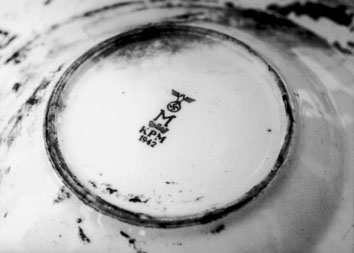Shadow Divers (26 page)

“I say we leave the remains undisturbed no matter what,” Kohler said.
“I agree,” Chatterton said. “We don’t touch them. Even if it means we never solve the mystery.”
For a moment, the divers sat in silence, startled by the finality and similarity of their thinking. Slowly, each explained his reasoning until it became clear that they had arrived at their conclusions for identical reasons. Their discussion lasted for hours. Their resolve pivoted around five principles:
1. Respect for the crewmen. The U-boat men were sailors. They had risked their lives to serve their country. By doing that, they had earned a respect that entitled them to rest undisturbed.
2. Respect for the families in Germany. Neither diver could bring himself to tell a crewman’s family that he had solved the mystery by rummaging through the pockets of their loved one’s corpse. Nor were they willing to lie to a man’s family and say that they had not done so if in fact they had.
3. Honoring the brotherhood of the deep. As submariners, the U-boat men had embraced the risks of living below the ocean’s surface. The divers existed in the same place, abided by the same laws, and faced many of the same perils, all of which generated a feeling of brotherhood and a sense of protectiveness toward the remains.
4. Protecting the image of wreck divers. The
U-Who
had become international news, Chatterton and Kohler emissaries of wreck diving. Their behavior would reflect on the sport for years.
5. Doing the right thing. The commitment to solve the mystery had originated in the instinct to do right by the crewmen. To violate their remains in order to find an answer would defeat the dedication to dignity with which the project had been undertaken.
Chatterton and Kohler agreed on a simple guideline. If they saw a piece of identification lying behind, say, a skull, they could move that skull to retrieve the tag. But they would not search remains for evidence, even if they believed such a search would be productive. Moreover, they would create an environment of peer pressure to urge—even coerce—other divers to behave similarly.
Driving home that night, Chatterton contemplated a final reason why he had determined to leave the remains undisturbed, a reason that seemed too personal to share with Kohler. More than ever, diving had become a reflection of life to Chatterton. The principles by which he had made himself a great diver were the same principles by which he lived. If he were to lower the bar now because he was frustrated, who would he be?
Kohler, too, had kept a reason to himself. His German heritage, so much a part of his identity since childhood, had been reawakened in these brushes with the fallen crewmen. He never kidded himself about the U-boat’s purpose or about the madman who had sent it. As an American, he would have attacked the U-boat himself had he been patrolling the Atlantic. But he also recognized these fallen men as Germans. “These men,” Kohler thought to himself, “came from where I’m from.”
It took three months for the
Seeker
to set sail again for the
U-Who.
In September, the divers had to make the most of their opportunity; the weather would be unpredictable come fall, and this might be the last U-boat dive of the season.
Optimism aboard the boat was muted this time around. Chatterton and Kohler had exhausted their leading theories and had whiffed in their hunt for an identifying artifact. Their disappointment, however, did not extend to the Rouses. From the moment father and son boarded the
Seeker
they began their high-octane bickering, sniping at each other’s equipment, sexual prowess, age, diving ability, sandwich choice, and—particularly odd to eavesdroppers—family ancestry. As before, Chris said little about what he hoped to accomplish on the U-boat. Chrissy was more forthcoming.
“I’m going to identify the wreck,” the junior Rouse told Chatterton. “I’m going to be the one to do it.”
As before, Chatterton and Kohler splashed together and tied in the anchor. This time, Chatterton swam toward the stern and dropped into the blown-out deck section that led to the aft torpedo room. His off-season research had revealed that this room contained an auxiliary steering station possibly marked by a brass tag. But when he began to look around, he saw a boot, then a life jacket, then several skulls, femurs, and other remains, a boneyard before him. It was possible that the answer to the mystery lay within the remains. Chatterton turned and swam out.
Kohler, in the meantime, had chosen to explore forward. As he entered the noncommissioned officers’ quarters, he spotted the cuff of a dark blue shirt that appeared to have spilled from a cabinet. Since it lay far from the human remains in the compartment, Kohler felt comfortable tugging at the shirt. Black silt billowed from the cuff. When the cloud cleared, he saw an arm bone in the sleeve. He let go of the shirt and apologized aloud, saying, “I’m so sorry. I had no idea.” He replaced the shirt where he had found it and began to leave. A few feet later, as he neared the galley, he shined his flashlight under a piece of wood. The eye sockets from a skull stared back into his. Kohler’s heart pounded. This was a bad day. He apologized again and made his way from the wreck.
Chatterton and Kohler’s second dive was equally unproductive. The Rouses, however, had better luck. In the galley, Chrissy had discovered a canvaslike fabric imprinted with German writing.
“I don’t know what the words mean,” Chrissy told Chatterton and the other divers topside. “All I know is I gotta dig the thing out. It’s stuck in there. But it looks important. I think I can get it on the next trip. This could be the thing.”
The Rouses, however, would have to hope that the weather held. Rough seas and violent storms could mess with anyone’s project over the course of a long off-season. As Nagle fired the diesels and turned the
Seeker
back toward Brielle, every diver on the boat wished for just one more trip before winter.
In early October 1992, Nagle booked the
Seeker
for the season’s final journey to the
U-Who.
It would be a two-day venture, held over the Columbus Day weekend. The divers would have a final shot.
The day before the trip, Nagle called Chatterton and begged out of the trip.
“I just don’t feel like it,” Nagle grunted.
“Bill, this could be the time. We need you,” Chatterton said.
“Don’t you get it?” Nagle exploded. “After I’m dead nothing matters! Fuck the U-boat!”
Chatterton tried to reassure his friend, but he had seen this transformation building all summer. Nagle had begun the season reflectively, taking comfort in the idea that even if he were unable to sober up and rebuild himself for diving, the
Seeker’
s legacy would outlive him. Now jaundiced and sicker than ever, a failure at countless rehabs, he could not bring himself to take his own boat to one of the biggest dives ever.
DAN CROWELL
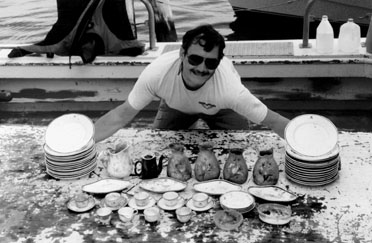
Bill Nagle in 1991, with a major score from the second-class area of the
Andrea Doria
.
DAN CROWELL
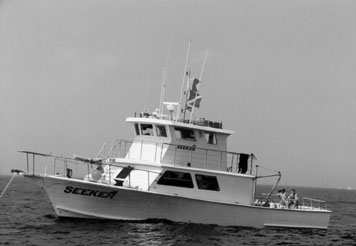
The
Seeker
was built for a single purpose: to take scuba divers to the most dangerous shipwrecks in the Atlantic Ocean.
JOHN CHATTERTON
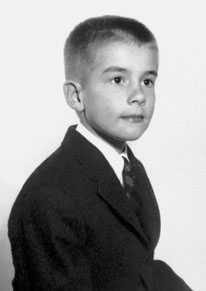
“It was the salt water that gave John his feeling.”
JOHN CHATTERTON
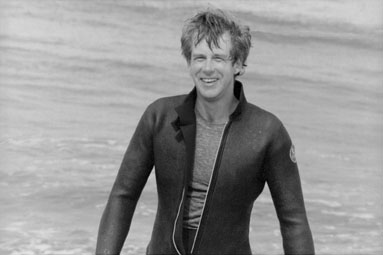
John Chatterton, preparing for one of his first wreck dives, West Long Branch, New Jersey, summer 1983.
RICHIE KOHLER
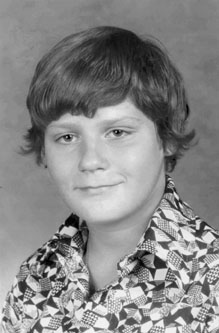
“Richie never stopped wondering how people could be left in the water when they had loved ones at home who needed to know where they were.”
RICHIE KOHLER
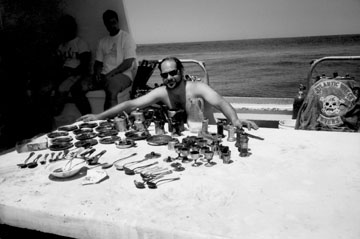
Richie Kohler, “tonnage king” and Atlantic Wreck Diver.
JOHN CHATTERTON
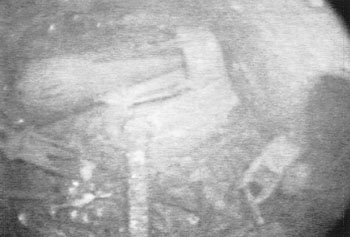
The torpedo (
upper left
) discovered by John Chatterton inside a wreck he and others had believed was probably just a pipe barge.
BILL DELMONICO
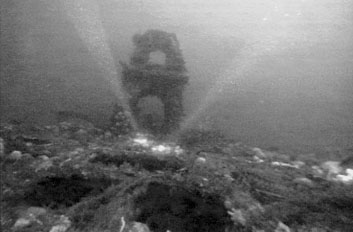
Topside view of the wreck’s antiaircraft gun mount.
STEVE BIELENDA

Steve Bielenda, “King of the Deep.”
TIME LIFE PICTURES/GETTY IMAGES
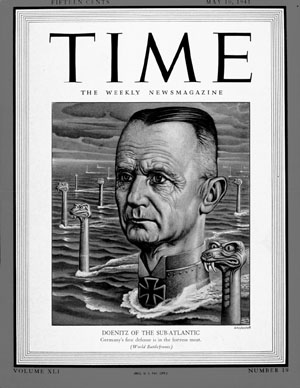
Karl Dönitz and the U-boat terror,
Time
magazine, May 10, 1943.
RICHIE KOHLER
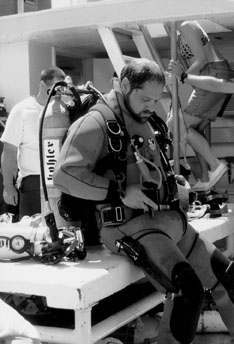
Richie Kohler gears up on the
Seeker
’s dressing table. Note the German-style lettering on his tank, a Kohler trademark even before the discovery of the mystery U-boat.
RUBY MILLER
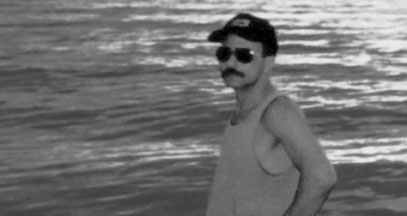
Steve Feldman
KEVIN BRENNAN
